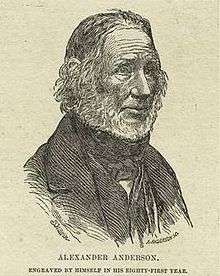Alexander Anderson (illustrator)

Dr Alexander Anderson (April 21, 1775 – January 17, 1870) was an American physician and illustrator.[1]
Biography
Anderson was born in New York City to Scottish parents.[2] "At the age of twelve years he made his first attempts at engraving on copper, frequently using pennies rolled out, and on type-metal plates. He received no instruction, and his knowledge was acquired by watching jewelers and other workmen." Anderson was a contemporary of Thomas Bewick, and published his first work in Arnaud Bernaud's "The Looking Glass of the Mind" in 1794. However, he was urged by his parents to pursue a career in medicine. He apprenticed with Dr. William Smith at fourteen and received his license at twenty. He became the first doctor at what would become Bellevue Hospital, established to deal with an outbreak of yellow fever in New York City in 1795.[3] When the epidemic ended, he sought an academic degree in medicine, "married, became a father, and opened a medical office"; however, he soon abandoned this office in favour of a shop "that sold children's books he personally engraved".[4]
Another outbreak of yellow fever began in 1798, and Anderson returned to Bellevue as the resident physician. [4] He resigned a few weeks later after his three-month-old son, brother, and father all died in the epidemic. His wife and mother died soon afterwards.[5] Anderson then became an engraver and was termed "America's First Illustrator".[6]
He is one of the earliest American wood-engravers. He produced works for books, periodicals, and newspapers. Anderson is the author of the cartoon Ograbme, a spoof on the Embargo Act of 1807.
Anderson died in 1870, at the age of 95.[6]
Notes
- ↑ Alexander Anderson | People | Collection of Smithsonian Cooper-Hewitt, National Design Museum
- ↑
 Kelly, Howard A.; Burrage, Walter L., eds. (1920). "Anderson, Alexander". American Medical Biographies. Baltimore: The Norman, Remington Company.
Kelly, Howard A.; Burrage, Walter L., eds. (1920). "Anderson, Alexander". American Medical Biographies. Baltimore: The Norman, Remington Company. - ↑ Oshinsky 2016, p. 19.
- 1 2 Oshinsky 2016, p. 20.
- ↑ Oshinsky 2016, pp. 26–27.
- 1 2 Oshinsky 2016, p. 27.
References
- Oak Knoll Press, New Castle DE 19720 & American Antiquarian Society, Worcester, MA 01609
- Oshinsky, David (2016). Bellevue: three centuries of medicine and mayhem at America's most storied hospital. Doubleday. ISBN 9780385523363.
- Pomeroy, Jane R. (2005). Alexander Anderson, 1775-1870, Wood Engraver and Illustrator, an Annotated Bibliography. New Castle, DE and Worcester, MA: Oak Knoll Press and the American Antiquarian Society.
- Pomeroy, Jane R. (2014). Alexander Anderson's New York City Diary, 1793 TO 1799. New Castle, Delaware: Oak Knoll Press and American Antiquarian Society.
External links
- The works of Alexander Anderson at the NYPL Digital Gallery
- The Alexander Anderson Print Collection at the New-York Historical Society